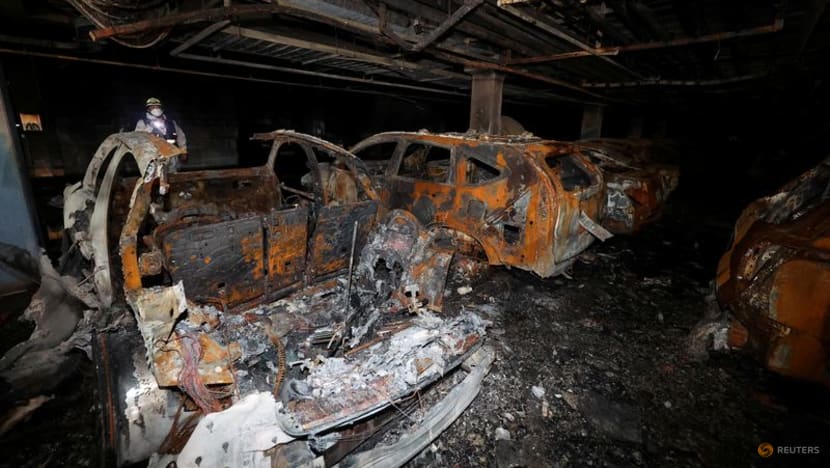Commentary: The real lessons South Korea should learn from an EV fire
Alarm has risen in Seoul over industrial groups losing their technological edge, says Christian Davies for the Financial Times.

SEOUL: Senior Korean officials are traditionally reluctant to say anything that could be construed in Beijing as antagonistic or confrontational. So it came as a surprise to some when South Korean Finance Minister Choi Sang-mok told the Financial Times this year that his country’s economic relationship with China had transformed over the past decade from one of mutual benefit into a “rivalry”.
Choi’s bluntness reflects a growing sense of alarm in Seoul that South Korea’s leading industrial groups are losing or have already lost their technological edge over emerging Chinese rivals, and that the public remains complacent about the scale of the challenge and its consequences.
For about two decades after South Korea and China first established diplomatic relations in 1992, Korean companies were able to ride China’s technology boom by offering Chinese tech companies more sophisticated components and products than they were able to produce themselves.
But in almost every sector bar the most advanced semiconductors, that is no longer the case. Chinese companies have either surpassed, matched or are rapidly closing the technology gap with South Korea in sectors ranging from electric vehicles to smartphones. Despite this, many Koreans continue to comfort themselves with the idea that Chinese rivals remain unable to compete when it comes to quality.
BACKLASH OVER BATTERIES
Korean media outlets report enthusiastically on scandals at Chinese factories. The way these stories are shared and presented by them and on social media have fed a perception that Chinese products are by definition unreliable and unsafe, and Korean products inherently superior.
This was illustrated by the reaction in South Korea to a luxury Mercedes-Benz EV that caught fire last month in an underground garage in the western Korean city of Incheon, hospitalising 23 people and damaging 40 other vehicles. The incident sparked a public backlash against electric vehicles, with residential and office buildings banning them from their car parks, EV owners panic selling their cars and several EV manufacturers giving in to pressure to disclose their battery suppliers for the first time.
It soon emerged that the Mercedes had contained nickel-manganese-cobalt (NMC) batteries manufactured by Farasis Energy, a lesser known Chinese battery producer. According to Korean media reports, local EV drivers responded by demanding to know if their vehicles contained Chinese or Korean batteries. Some prospective buyers of EVs told dealers they were unwilling to buy cars with Chinese batteries.
This is despite the fact that the actual cause of the Mercedes fire in Incheon has yet to be established. As some observers were quick to point out, leading Korean battery makers have their own record when it comes to EV fires - in 2021, LG Energy Solution paid General Motors up to US$1.9 billion following a series of fires resulting from faulty batteries supplied for GM’s mass market Chevrolet Bolt.
Bernstein analyst Neil Beveridge notes that there is "no evidence to suggest that Korean batteries have better safety performance than Chinese batteries".
THE BIGGER FEAR
The reality, from a Korean perspective, is more worrying. South Korean battery makers have traditionally specialised in the production of NMC batteries, which are more expensive but have a higher density and therefore better performance than the lithium iron phosphate (LFP) batteries that leading Chinese battery makers specialise in.
But as car manufacturers come under intensifying pressure to reduce the price of electric models in response to sluggish consumer demand, and as Chinese companies improve the performance of their LFP batteries, the rationale for opting for a Korean battery is growing weaker and weaker.
With car companies increasingly turning to Chinese LFP batteries as a means to bring down prices, Korean battery makers are being forced to start offering LFP batteries themselves. This means attempting to adopt an unfamiliar technology and move on to China’s home turf just when the balance sheets of the manufacturers are under pressure from disappointing global EV sales.
It is this, not the safety record of Chinese batteries, that should be keeping Korean policymakers up at night. If Korean manufacturers are no longer able to compete not just on price but also on quality and performance, they will have little to offer beyond the label “Not Made In China”.














